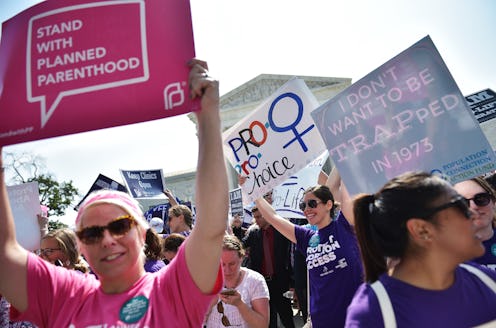News
Will Texas Abortion Clinics Be Able To Reopen?
On Monday, the U.S. Supreme Court ruled 5-3 to overrule two requirements under the omnibus bill HB2, a Texas law which limited women's access to reproductive services. HB2 was found to have imposed an "undue burden" on women seeking reproductive services, as it forced abortion providers to have admitting privileges at hospitals within 30 miles of their clinics. Ultimately, this would sometimes force women to travel great distances to receive abortion services, as the clinics are not always easily accessible throughout a state. However, now that the bill was ruled unconstitutional, will closed Texas abortion clinics reopen right away?
The lead plaintiff in Whole Woman's Health v. Hellerstedt explained that, although the bill was deemed unconstitutional and it will soon no longer have lawful status, it will de facto exist until the proper changes are enacted. For example, in Texas, there are nearly 5.5 million women of reproductive age. Not all of them live within close proximity to a hospital. So on June 9, 2015, when the Fifth Circuit authorized Texas to enforce HB2 against all Texas abortion facilities except the McAllen clinic operated by Whole Woman’s Health, it affected Texas women drastically.
The McAllen clinic was forced to meet staffing and administrative requirements designed for ambulatory surgical centers, and was limited to treating patients who resided in the four counties of the Lower Rio Grande Valley. This effectively turned women from neighboring counties away, and the next closest abortion provider is in San Antonio, over 200 miles from these women. These arrangements still stand today, and will remain until clinics can reopen.
Amy Hagstrom Miller, lead plaintiff in Whole Woman's Health, spoke with Vox about the struggles in reopening abortion clinics after the historic victory. "People often say, ‘Are you going to reopen if you win?’ And it’s not just a matter of will or gumption," she said. "Philosophically, my answer would be, ‘Hell yeah.’"
But there are countless logistics issues with reopening any of the previously closed clinics. First, there are basic things like medical tools and equipment to repurchase, utility bills to pay, insurance (for security and malpractice), and vendors to partner with. After that, it's important to note that once abortion clinics close, they lose their license to perform abortions in their respective state. This licensing procedure can't happen overnight, so reopening clinics will be further delayed to account for this process. Another aspect, perhaps most important, is finding an entire staff of doctors and assistants to operate the clinic. This isn't easy to do, especially in a state that has a history of abruptly closing numerous clinics in a span of three years, considering many of these previously laid-off staff members have likely found work elsewhere.
As Justice Ruth Bader Ginsburg explained, without proper abortion clinics, women will seek dangerous and sometimes life-threatening alternatives. This destroys the argument that HB2 promotes women's health and safety. It is unfortunate that so many abortion clinics were forced to close. The state of Texas has just 19 clinics open currently, compared to 41 before HB2 passed in 2013. As Hagstrom Miller explained:
Clinics don't reopen overnight. We have a daunting task ahead of us to determine whether and how we can reopen our health centers that were forced to shut their doors over the past several years. Renewing leases, hiring staff, and working with the communities that we previously served to help us reopen for care. ... Now, we must redouble our efforts across the country to end similar state restrictions that push abortion out of reach for too many women.
Although this is a striking victory for women's autonomy and health, the battle is nowhere near done. There is still much work ahead, especially in getting clinics to reopen.
